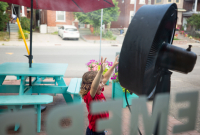Support strong Canadian climate journalism for 2025
White Rock Mayor Darryl Walker says it could take months and millions of dollars to repair the city's beloved pier after part of it was ripped away during an intense windstorm that swept over British Columbia's southern coast.
It's one of several communities dealing with the aftermath of Thursday's storm, which BC Hydro is describing as among the most severe in many years.
The 457 metre pier will be closed until further notice after several boats broke away from their moorings and battered the middle of the pier, eventually collapsing a 30-metre section, Walker said.
"The damage that was done to our pier appears to be something that will take some months for us to recoup from, it's extremely damaged," he said.
The force of the waves also tossed logs and concrete picnic tables onto the popular promenade along the city's waterfront and Walker said that area will be cordoned off while repairs are made.
One person was trapped at the end of the pier and had to be airlifted by helicopter to safety at the height of the storm but no one was hurt.
BC Hydro said more than 100,000 customers were still without power by late Friday afternoon and some could remain in the dark for days as crews work to repair outages on Vancouver Island, Metro Vancouver, the Sunshine Coast and Fraser Valley.
"Yesterday's windstorm was one of the most severe storms BC Hydro has experienced in years," a post on the utility's website said.
At its height, about 400,000 customers lost electricity and many remained without power overnight.
Environment Canada says gusts topped 100 km/h just south of Vancouver and in parts of the Fraser Valley, making the storm more powerful than the 2006 gales that levelled a large section of forest in Stanley Park.
The City of Nanaimo issued a statement Friday saying the storm caused its water treatment plant to breakdown.
While the water is safe to drink, the city urged its residents and businesses to restrict their use until the full system is restored, in order to preserve enough for firefighting emergencies.
The city's emergency operations centre has been activated and staff are preparing contingency plans in the event that the water treatment plant does not return to full operating capacity soon.
City pools and arenas are closed until further notice.
One woman died when a tree fell on her tent in a wooded area near Duncan, RCMP said.
There were four other people in the tent and two male occupants were also injured. One was airlifted, and the other was transported by ambulance, to hospital for treatment.
The BC Coroner Service said the woman was in her late 20s but it's too early in its investigation to release further details.
"Our investigation will look at how she died, where and by what means," spokesman Andy Watson said.
All wind warnings have been dropped and service is getting back to normal on BC Ferries routes after most sailings were cancelled Thursday.
The first sailings Friday were already full on most major routes, while power outages at smaller terminals were affecting those schedules.





Comments